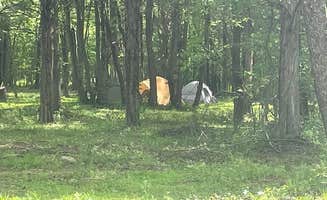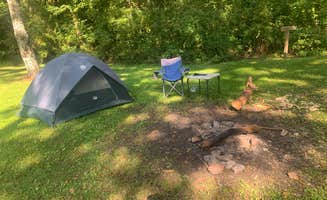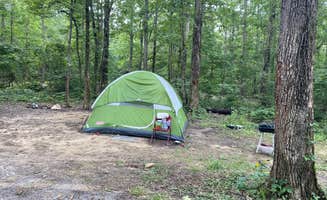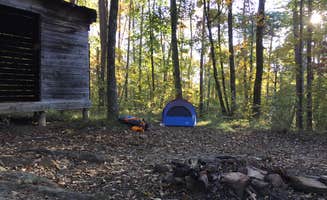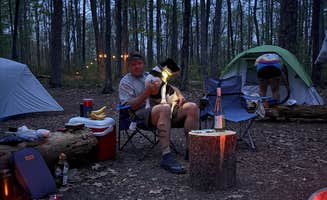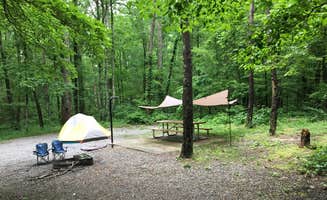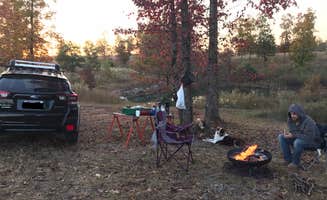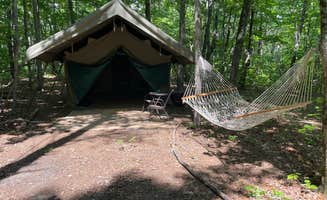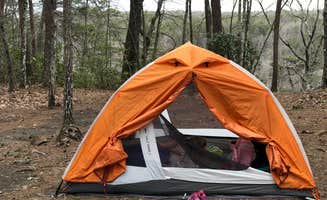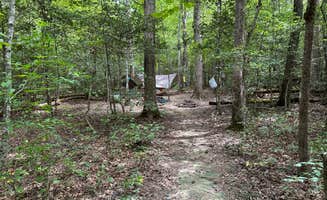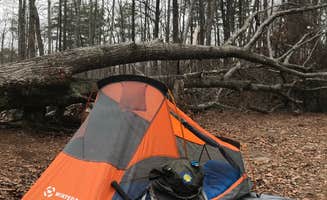Tent camping in Sequatchie, Tennessee provides access to the Cumberland Plateau's diverse ecosystem, where elevations range from 1,000 to 1,900 feet. The region experiences moderate temperatures with summer highs averaging 85°F and winter lows around 30°F. Many campgrounds in the area maintain trails that connect to the extensive Cumberland Trail system, allowing campers to explore the region's distinctive sandstone formations and native hardwood forests.
What to do
Waterfall swimming and photography: 45-minute hike from Foster Falls Campground takes you to a popular swimming area. "Campsite was clean. The waterfall is awesome. It is a very short drive and short rocky hike to the water fall. You can see the falls from a distance if you don't want to hike down," says BobEarl S.
Sport climbing on sandstone: Foster Falls has established routes for various skill levels. "Really beautiful scenery on somewhat strenuous hikes to waterfalls, some good sport climbing, and a few trails that will take you really high up so you can look down at the beautiful green canopy," notes Kelly M.
Fishing at Davis Pond: This secluded campsite offers quiet fishing opportunities. "Down a long and winding (and dusty) gravel road into the WMA is the Davis Pond camp site, a real gem with shady trees and a fishing pond," writes William S., adding that "a couple was there already...luckily one area was available upon my arrival."
Wildlife observation: Early mornings at Savage Falls Campground are ideal for spotting native wildlife. "You gotta be super fit to get to this place but once you do, it's AMAZING. I did notice bear scat on my hike in and that was a bit of a concern but once everyone settled in at night, it was great," reports Scott G.
What campers like
Secluded tent sites: Father Adamz Campground offers private camping spots away from crowds. "The hike in is pretty steep in parts and very rocky. Definitely a good workout! The hiking trails are well maintained and the scenery is great," shares Jeff C.
Stunning overlooks: Stone Door Campground connects to impressive viewpoints. "This campsite is great for novice primitive campers. The campsites are secluded, but very close to the parking lot. There is an outhouse and drinking water close to the campsites," according to Aaron S., who adds "I did the Big Creek Rim trail. It was relatively flat, but had some beautiful overlooks."
Backcountry accessibility: Several campgrounds offer introductory backcountry experiences. "Alum Gap campground, situated in the backcountry of Tennessee, is not only a hidden gem but also a perfect choice for those new to backpacking. Accessible via a straightforward hike of just a little over one mile from the Greeter Falls parking area," explains Asher K.
Multiple trail connections: Most tent sites connect to extensive trail networks. "This camp can be found at the end of either the Savage Gulf Big Creek Rim or Gulf Trails. It can also be reached from Greeter Falls," notes Charles M. about Alum Gap.
What you should know
Bathroom maintenance varies: Facilities at some campgrounds receive minimal upkeep. At Davis Pond, "there is a two-station pit toilet, it's a bit of a horror show with a lot of trash accumulating in the structure," warns William S.
Water sources require planning: Many sites have limited water access. At Alum Gap, "I encountered a small creek, which served as a sufficient water source. Depending on recent rainfall, you might need to collect water back at the Greeter Falls area," advises Asher K.
Road access challenges: Some campgrounds require high-clearance vehicles. Davis Pond requires navigation through "a windy gravel road. The last 1/2 mile gets a little dicey and needs a vehicle with some clearance," cautions Tessa B.
Wildlife precautions: Bears are present in the area. One camper at Savage Falls noted bear scat during their hike in, recommending proper food storage.
Tips for camping with families
Start with walk-in sites: Stone Door offers an accessible introduction to primitive camping. "Our family camped here about 2 years ago as our first camping trip together. It was perfect. We love how much space and privacy we had and will be a regular camping trip for us. You have to hike your gear in so it's not quite as convenient as car camping, but it was also a way for us to get somewhat of a backcountry experience with young children," shares Robbie M.
Consider hike difficulty: Some trails are steep but manageable for older children. "My grandson and I spent 23-25 June camping at Father Adamz campground. All of the sites in the campground are level and have adequate shade. The short hike down to the base of the waterfall is fairly steep and very rocky, but well worth the effort," reports Jeff C.
Pack water filtration: Many sites require water treatment. "I am glad we brought along our water filtration system as it was only a short hike down to the river to fill up," recommends a Father Adamz camper.
Check noise levels: Some campgrounds experience weekend traffic. At Hunter's Check Station, a camper noted: "Not a quiet camping area lots of road noise and traffic."
Tips from RVers
Limited RV options: Most Sequatchie tent camping areas aren't suitable for RVs. Whippoorwill Woods Nature Retreat accommodates small RVs with primitive amenities. "Kristine was very communicative and hospitable. She provided plenty of water complimentary along with a s'mores gift bag. There was even a very clean local porta potty," reports katie.
Consider campground layout: At Foster Falls, tent sites are more numerous than RV spots. "Foster Falls Campground has 26 sites, most of which are very large and spacious. As is common in loop campgrounds, the sites in the center of the loop--especially sites 1-13--are very open, with little privacy between sites," explains one camper.
Plan for limited hookups: No campgrounds in the immediate Sequatchie area offer full RV hookups, so come prepared for dry camping.


